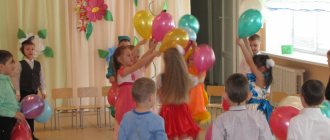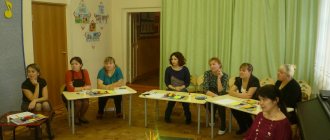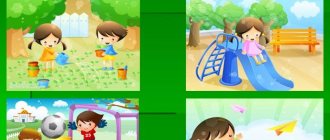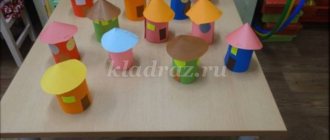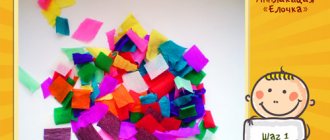Theoretical aspects of speech therapy classes in kindergarten
The goals for speech therapy sessions are usually general:
- Development of articulatory motor skills.
- Formation of pronunciation skills (depending on the stage of work on a particular sound).
- Development of phonemic awareness.
- Development of sound analysis skills.
- Improving lexical and grammatical structures.
- Development of fine motor skills in preparation for writing.
Mastery of the native language is the most important acquisition of a child in preschool childhood.
Children’s speech, which is beautiful in itself, also has scientific value, since by studying it, we thereby discover the bizarre patterns of children’s thinking.
K. I. Chukovsky
The methodological goal of an open speech therapy lesson is to demonstrate what teaching methods and techniques the teacher uses and how the material is presented in an accessible manner. If the lesson is held at the end of the semester, you can see what progress the children have achieved during their training.
Tasks for different age groups
For each lesson, one specific goal and several main tasks are set that will be solved in the process of educational activities.
Tasks for pupils of junior groups of preschool educational institutions:
- Dictionary expansion.
- Development of auditory and visual attention.
- Teaching correct sound pronunciation.
- Development of the ability to distinguish objects and describe their external signs for the ability to compose coherent descriptions.
In the middle group, speech therapy classes solve a number of problems:
- Activation of speech activity.
- Formation of correct breathing when speaking.
- Development of articulation and speech hearing.
- Development of associative thinking (helps to establish connections between various concepts, promoting the development of literate speech and logical construction of sentences).
In communicating with adults and peers, the child masters the rules of human speech and learns new words.
For preschoolers of the senior group, the following tasks will be relevant:
- Development of skills to characterize sounds (long, short, how they are pronounced, in which words they appear).
- Formation of ideas about deaf and voiced sounds.
- Development of dialogical speech.
Examples of tasks for preparatory group students:
- Improving the accuracy of facial expressions and gestures when speaking.
- Improving the ability to answer questions accurately and clearly.
- Development of intelligible, literate speech.
- Formation of the skill of correct speech breathing.
When working with preschool children, the speech therapist keeps records of each child’s speech development
The native word is the treasury of all mental development and the treasury of all knowledge.
K. D. Ushinsky
Table: speech therapy techniques in working with preschoolers
| Reception name | Description | Why it's useful | Relevance of use in open classes | Examples of games |
| "Sand Games" | The choice of games depends on the age of preschoolers. To implement such techniques, the teacher needs to have several boxes one-third filled with sand, sets of small toys (people, vehicles, plants, animals), and you can also get a set of letters made of wood or plastic for word-composing games. Playing with sand is good for introducing sounds and teaching children how to spell words correctly. | During the game, children better remember educational material, learn to independently describe objects from memory, and develop fine motor skills to prepare their hands for writing. In addition, working with sand relieves unnecessary stress and increases the emotional background of children. | Tasks in the form of games help children to distract themselves and relax, since some of them may feel uncomfortable in the presence of strangers in class. On the other hand, this is a good way to let children express themselves, show their independence and imagination. The teacher can also show creativity by showing colleagues various options for educational games that are interesting for preschoolers. |
|
| Facial exercises | The reception is suitable for pupils of all age groups. These exercises help develop the mobility of the facial muscles and allow you to further develop clear articulatory movements. | Exercises influence the further development of articulation, help the child control facial expressions during a conversation, so that it is easier for him to explain what he feels. | You can start the lesson with this technique by involving guests. For example, asking children with certain emotions to tell a story to guests, which will help the students not feel uncomfortable in the presence of strangers and will lift their spirits. The more emotions a teacher can use in their work, the better. There is an opportunity to demonstrate to colleagues the collected material, which they can also use in the future (pictures with emotions, images of various animals, “mood clouds”, cards with tasks, etc.). | In the first lessons, everything starts with simple exercises - frowning your eyebrows, opening and closing your eyes alternately, gradually the movements will become more complex (raising your eyebrows together and in turn, smiling broadly, making your lips a “bow”, wiggling your nose, etc.). It is necessary to develop in children voluntary movements and control of facial expressions. It is best to ask preschoolers to depict certain emotions - joy, sadness, surprise, fear, anger, happiness, cheerfulness, jubilation, fatigue, etc. To ensure that children, especially younger preschoolers, do not lose interest in the lesson, visual material with images of emotions is used ( “repeat what’s in the picture”) or the emotional states of animals, which can be given names (sly fox, angry wolf, kind bear). |
| Breathing exercises | Applicable to all age groups in every lesson. Rhythmic noisy breathing helps saturate the body with oxygen and get out of a stressful state. | Helps develop proper breathing when speaking, calms children and sets them up for learning. | It is worth starting a lesson with such gymnastics to make it easier for children to maintain attention and a positive attitude in the future. Habitual activities calm the pupils, despite the presence of strangers. |
|
| Massage ball | Suitable for preschoolers of any age. Such balls are used to massage the palms and fingers, promoting the development of fine motor skills and preparing children's hands for writing, increasing the performance of each hand. | Develops fine motor skills, preparing the hand for writing. If children are already practicing with copybooks, then the massage ball can be used at the beginning of the lesson to warm up or in the middle to relieve fatigue. | Demonstration by the teacher of various exercises for children, showing the correct methodological instructions during the lessons. | You can use balls of different sizes to massage not only the entire hand, but also individual fingers, which the child will use to hold writing instruments in the future. |
| "Creating a situation of success" | The technique is suitable for children completing tasks in copybooks. The child writes in the workbook only with a pencil, and the teacher does not correct mistakes, only makes notes in the margins. This will allow the child to erase what he did wrong and correct the work himself. This technique helps to raise the student’s self-esteem, which will give him an additional desire to study. | Helps the child to believe in his own abilities, making him want to work better, try to complete tasks without errors and find flaws in his work himself. | This technique is relatively new, which makes it possible for the teacher to clearly show why it is not worth correcting mistakes for the child on his own and scolding him in case of failure. | |
| "Find the picture" | Images for cards should be selected in accordance with the age of the children and their vocabulary. Each child is given a card with various images (objects, animals, plants). You need to find pictures according to the principle indicated by the teacher. | Develops attention, memory, helps to better assimilate material. | There may be many options for tasks for children to demonstrate their existing knowledge and reveal the topic of the lesson. The teacher demonstrates the material he has collected (the pictures can be thematic, divided by the number of syllables, letters, etc.) and tasks with cards developed for different age groups. | Preschoolers can do a number of different activities with the cards. For example, select pictures whose names contain the letter “r”, select pictures whose names begin with a certain syllable, select pictures ending with a certain letter. |
| Unconventional exercises using health-saving technologies | Suitable for pupils of any age. A series of exercises that will improve the physical and mental state of students, relieve muscle tension and charge them with positive energy. | Exercises allow you to teach children methods of maintaining health, restoring strength, developing switching attention, relieving tension, stimulating performance and thinking. | Exercises allow preschoolers to quickly restore their working capacity, prevent fatigue, which means that children will work actively throughout the entire lesson. |
|
| Gaming techniques | Suitable for preschoolers of any age. The leading activity of preschool children is play. In a playful way, children perceive complex and tedious tasks with interest and complete them with pleasure. | They help maintain children’s interest in activities, develop positive motivation and cognitive interest. | Thanks to the game form, students are motivated to complete tasks. |
|
Motivating start to class
The organizational introductory stage must be carefully thought through, since the entire future success of the lesson may depend on it. The speech therapist needs to introduce children to the topic, interest them from the first minutes and maintain positive motivation for work until the end of the lesson. There are various methods of motivation and encouragement for this.
At the beginning of the year, a speech therapist can start a diary of his achievements for each pupil, where for each successfully completed task a beautiful sticker will be added, indicating the success of the preschooler. This method is more suitable for children of senior and preparatory groups in order to maintain interest in classes throughout the school year.
The outcome of the event largely depends on the motivation of the students at the beginning of the lesson.
For younger children, at the beginning of the lesson it is good to use wrist puppets, which “came to check” whether the children are ready for the lesson and what their mood is. For example, the teacher puts bear and bunny dolls on the hands, which ask the children questions (“Are you ready to start the lesson?”, “Are you in a good mood?”, “Are you sitting nicely?”, etc.).
In any age group, the lesson can begin with riddles on basic topics, so that the children themselves can guess what they will study today. This will help them immediately get involved in what is happening, start thinking and motivate them to give the correct answer.
From the middle group onwards, the introductory exercise “make a whole from parts” is used. Children are shown a picture with a plot from a familiar fairy tale, and then asked to tell what kind of fairy tale it is, who the characters are, what they are doing, where they are, and what words with the most letters are in this picture. The brighter and more complete the illustrations, the more interest children will have.
Pupils of the senior and preparatory groups can immediately be called into dialogue, for example, start a conversation about what they saw on a walk or on the way to kindergarten, what the weather was like, time of year, whether they saw animals and plants, what they remember most. This encourages children to immediately join the discussion, learn to competently retell what they saw, and clearly construct sentences.
A new interesting game will attract the attention of preschoolers for a long time
At the beginning of an open lesson for children of different ages, you can use an organizational moment with the participation of the adults present. The teacher invites the preschoolers to say hello to the guests, but to do this in an unusual way. Each child receives a face cut out of cardboard depicting a certain emotion. Children say hello with the intonation that best suits their pictures. Senior and middle preschoolers can be asked to write short stories about themselves or each other to introduce themselves to guests. A teacher should help younger children. He can ask the kids to tell the guests where in the group there are objects starting with a certain letter or with a given number of syllables.
Table: examples of motivating start to classes in different age groups
| Age group | Lesson topic | Purpose of the lesson | Example of a motivating start to a lesson | Relevance of the appointment |
| Junior | "In the village at grandma's" | Expand children's knowledge about pets. | A surprise moment at the introductory stage. The speech therapist shows the children a large decorated box and asks them to guess what is in it. Then he takes out a toy steam locomotive from the box and says that he will take the children to their grandmother in the village, where they will get acquainted with domestic animals. While children are “riding” on a steam locomotive, they perform speech exercises, imitating the sounds of riding (chug-chug, tu-tu). | This beginning of the lesson allows you to immediately include breathing exercises and simulating exercises, which will help children work better during the entire lesson. |
| Average | "In Search of Fairy Tales" | To strengthen children's ideas about numbers, time of day, and space. | Surprise moment. The teacher shows the children a book of fairy tales with completely blank pages. Having discovered the loss, you need to invite the children to go in search of fairy tales on the train to the library. The teacher says that the children will travel on tickets, and therefore they need to quickly find tickets that match the color of the train carriages (a didactic game, materials for which must be prepared in advance: tickets made of colored paper and a train made of cardboard carriages). | The game develops attention, logic, and allows you to reinforce the names of colors in a playful way, increasing children’s interest in the lesson and further tasks. |
| Older | "Zimushka-winter" | Summarize and systematize children's knowledge about winter. | Organizing time. Children each stand near their own chair. The speech therapist invites the children to play a game. He will ask riddles about winter, which preschoolers will take turns answering. The one who gave the correct answer sits on a chair. The game helps children engage in the activity with interest; it is necessary to prepare a large number of riddles in advance. | Attention task, development of auditory attention. From the first minutes, children are involved in the process, begin to think about the topic of the lesson, try to give correct answers, and reinforce the correct pronunciation of familiar words. |
| Preparatory | “Composing a story about your favorite fairy tale hero” | Develop logical thinking and competent speech. | Organizing time. There are paintings with images of fairy-tale characters on the board. The teacher says that the characters don’t remember what they look like, so he will name the characters’ names, and the children, without pointing at the picture, must describe the character’s appearance in their own words. | Children learn to compose descriptive stories, reproduce in oral speech what they see, and correctly construct sentences. The task develops attention and observation. |
How to prepare and conduct an open speech therapy session at a preschool educational institution
An open lesson differs from a regular lesson in that it is developed and conducted according to a specially prepared form of organization, where the teacher can demonstrate to his colleagues his methods and techniques of work, which he successfully uses to achieve high-quality results. For pupils, this is a normal activity, no different from a number of others, with the exception of the presence of strangers.
To conduct speech therapy classes, you will need a set of mirrors so that children can independently monitor the correctness of the exercises.
Preschool age is a period of intensive mastery of the child’s native language, rapid expansion of vocabulary, as well as understanding of various speech shades and intonations.
When preparing an open lesson, the speech therapist relies on a technological map, which includes a description of the goals, objectives, and each stage of the lesson. Based on the results of the event, information about the results obtained and an assessment of the children’s work in the lesson are entered into the document.
The technological map will help in preparing an open lesson, and in the future in analyzing the results
Topic index
Each topic includes new words that should expand the child's vocabulary. In classes, nouns, verbs, attributes of objects (seasons, weather, animals, people, etc.), adverbs, prepositions are studied. List of topics that a speech therapist can implement throughout the year:
- Autumn. Trees.
- Forest. Mushrooms and berries.
- Garden. Vegetables.
- Fruits. Garden.
- Autumn (generalized knowledge about autumn, its weather, months, behavior of animals and birds at this time of year).
- The human body.
- Wild animals.
- Animals of cold and hot countries.
- Pets.
- Migratory and wintering birds.
- Clothes, shoes, hats.
- New Year's celebration.
- Winter.
- House. Construction.
- Apartment. Furniture.
- Dishes. Products.
- Spring.
- Family.
- House plants.
- Professions.
- Fish. Ocean World.
- Transport.
- Space.
- Our town.
- Our country.
- Flowers.
- Insects.
To conduct individual open speech therapy sessions with students, you can use the appropriate card index.
Photo gallery: didactic games and diagrams for classes
Funny pictures will help preschoolers remember the correct use of prepositions
The game “Continue the Row” develops the logical thinking of preschoolers
The didactic game “Look and Name” develops classification skills and the ability to generalize
A supporting diagram will help your child write a story about himself
Older preschoolers learn to write descriptive and comparative stories from pictures
With the help of this game, the child consolidates knowledge about the methods of movement of animals.
The “Make a Word” game trains your knowledge of letters and sounds
This scheme will help consolidate preschoolers’ knowledge about professions
Lesson time plan
Like any other, speech therapy class in kindergarten consists of several stages:
- Organizing time.
- Explanation of the topic of the lesson.
- Description and characteristics of the sound that will be studied.
- Pronunciation of the necessary sounds in syllables, words, sentences.
- Physical education minute.
- Working on pronunciation.
- The use of sound in coherent speech, dialogue, and story.
- Summary of the lesson.
In different age groups, the duration of classes is different (from 10 to 30 minutes), so that children do not get tired and do not lose interest in educational activities. Thus, younger groups of preschoolers should study for no more than 10 (first youngest) or 15 (second youngest) minutes, middle groups - no more than 20 minutes, older groups - 25, in the preparatory group classes last up to half an hour. The same requirements apply to conducting open classes.
In the middle of the lesson, it is recommended to conduct a physical training session with elements of logarithmics
Table: examples of temporary lesson plan in different age groups
| Age group | Introductory stage, motivating beginning | Didactic games | Physical education or outdoor game | Speech exercises | Summarizing |
| Junior | 2 minutes. | 3 minutes. | 2 minutes. | 7 minutes (in game form). | 1 minute. |
| Average | 3 minutes. | 3 minutes. | 3 minutes. | 10 minutes. | 2 minutes. |
| Older | 3 minutes. | 4 minutes. | 3–5 minutes. |
| 2 minutes. |
| Preparatory |
| 5 minutes. | 5 minutes. |
| 2–3 minutes. |
Pupils in the preparatory group already know a lot and are able to concentrate, so the conversation method is actively used in classes.
Examples of notes for open speech therapy sessions
Below are speech therapy options for different age groups. Each stage is described in detail, the goals and objectives of the lesson are indicated. There are examples of games, literary works, necessary equipment and materials. It is shown how to summarize the lesson, what methods and techniques a teacher can use.
- Summary of a lesson in the junior group “Spring has come” with elements of logorhythmics (Ushakova N. A.).
- Lesson summary for the middle group “Journey for a Magic Flower” (Guseva N.).
- Lesson summary for the senior group “Journey to a spring meadow” (Fedorova E.).
- Summary of the lesson in the preparatory group “Spring” (Mukhametgareeva R.).
- Lesson summary for children with general speech underdevelopment “Birds of Migratory”.
- The script for the speech therapy holiday “Correct Speech” (Bogatelia I.N.) is almost entirely created in poetic form, which can increase children’s interest in completing tasks and influence aesthetic development (cause a desire to write poetry themselves, study fiction together with their parents and teacher ).
Open lesson for speech therapist certification
Every teacher in his work is faced with the fact that his work is evaluated. This allows you to confirm his level of professional knowledge.
An open lesson means that other teachers will be present. This allows specialists to exchange experiences. The speech therapist at such an event should demonstrate new technologies.
The lesson should be structured taking into account the individual characteristics of the children
Representatives of the commission evaluate the organization of the lesson, its stages, the didactic activities of the teacher, and the characteristics of the students. Parents can also attend an open lesson with a speech therapist - this allows them to clearly see the details of the training.
Important! A speech therapist should not be afraid of assessments, as the goal is to identify strengths and weaknesses.
Young specialists are exempt from certification for three years. During this time, they must learn how to conduct classes and senior colleagues help them with this. To hold an open event, you need to choose a lesson topic that corresponds to the preschool curriculum.
According to the Federal State Educational Standard, a speech therapist must use the principles of didactics, follow the goals of the lesson, optimally select methods and motivate children.
Such an event allows the teacher to show all his creativity.
Voluntary certification is carried out in the year the qualification category is received. In other cases, once every five years. Therefore, he needs to constantly develop and accumulate class notes.
